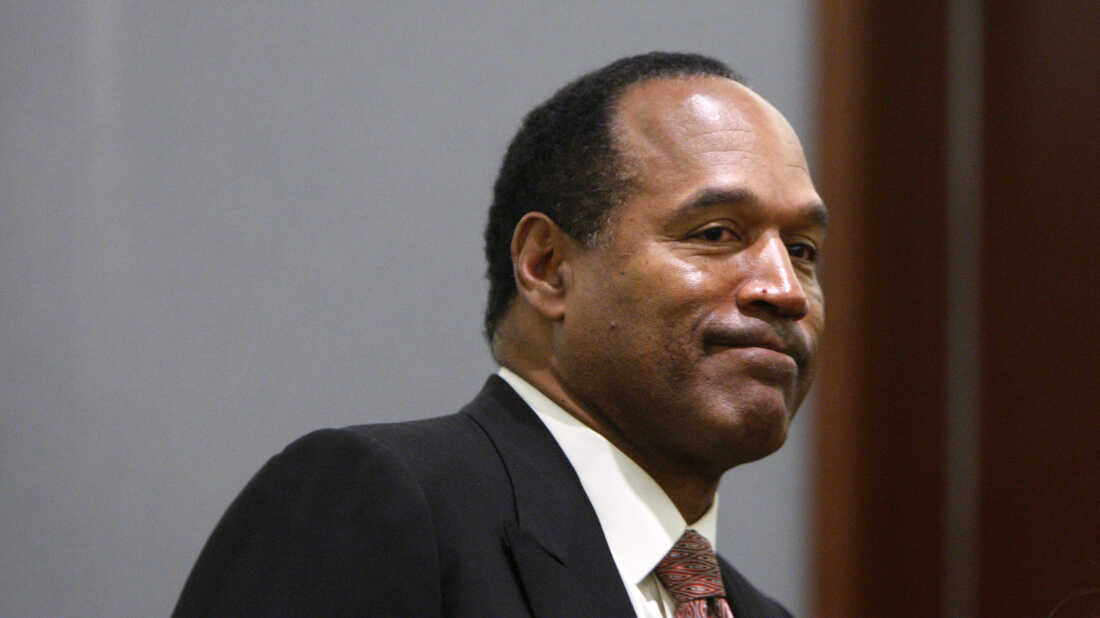O.J Simpon’s complicated legacy; Ukraine passes new draft law
Good morning. You’re reading the Up First newsletter. Subscribe here to get it delivered to your inbox, and listen to the Up First podcast for all the news you need to start your day.
Today’s top stories
Orenthal James Simpson, known as O.J., died yesterday at 76 after a battle with cancer. Before his infamy in the so-called “trial of the century” of the murder of his ex-wife and her friend, Simpson was a football star and Hollywood actor.
O.J. Simpson, pictured in September 2008 in Las Vegas, died Wednesday, according to a statement from his family.
Isaac Brekken/Getty Images
hide caption
toggle caption
Isaac Brekken/Getty Images
O.J. Simpson, pictured in September 2008 in Las Vegas, died Wednesday, according to a statement from his family.
Isaac Brekken/Getty Images
NPR’s Mandalit del Barco covered his murder trial in Los Angeles in the ’90s. “Audiences loved him,” she tells Up First. “And that’s why it was so shocking what came next.” Del Barco says that the reaction to the verdict back then was somewhat divided along racial lines. Some White Angelenos she spoke to were outraged. But some Black Angelenos felt conflicted, saying that whether or not Simpson committed the murder, for once, justice was on the side of a Black man.
After months of deliberation, Ukraine’s parliament yesterday passed a law to mobilize hundreds of thousands of new soldiers. Under the new law, military-age men are required to carry draft registration documents with them at all times, making it easier for the government to find conscripts. In one controversial move, the law also allows convicts — previously banned from the military — to serve in return for a suspended sentence. Current Ukrainian soldiers are exhausted, as Russian troops are now on the offensive, two years into its full-scale invasion.
NPR’s Joanna Kakissis speaks with soldiers’ families, who tell her they’re most upset about “long deployments with no end.” Some Ukrainian soldiers have been on the front line since the invasion began, with some fighting while injured. Kakissis says the new law doesn’t address long deployments, but officials are considering a separate law on the issue.
We, The Voters
NPR
NPR
This essay was written by Eric Marrapodi, vice president of news programming and Eva Rodriguez, vice president and executive editor. We, The Voters — The Left. The Right. The Disillusioned is a special series from NPR exploring the issues most important to you when choosing your next leader. Join NPR next week as we dive into how gun violence affects different communities.
What do you want from your government?
It’s a question that speaks to the core of our country. In a presidential election year, it comes up a lot.
For the next three months we’ll dig into the matters you’ve signaled are most important to you when choosing a leader with outsized power to shape the issues and the results. Consistently top of mind for NPR listeners and readers are the often complicated questions related to gun violence, the economy, immigration, reproductive rights, healthcare, and U.S. foreign policy.
NPR’s special sauce is our ability to deliver local, national and international perspectives in partnership with member stations in cities and towns, large and small and across the political spectrum. We work hard to fairly present differing viewpoints that provide a complete picture.
Our hope? That our rigorous and respectful reporting spurs meaningful conversations within our broadcast programs, on our site and podcasts and at dinner tables across the land that help you decide what’s right for you, your family and your community.
Starting Monday, NPR is going to dive deep on gun violence and its impact on communities. We hope you will check out the reporting and join the conversation.
Weekend picks
Kirsten Dunst as Lee in Civil War.
A24
hide caption
toggle caption
A24
Kirsten Dunst as Lee in Civil War.
A24
Check out what NPR is watching, reading and listening to this weekend:
Movies: In Civil War, Kirsten Dunst plays a jaded war photographer who embarks on a harrowing journey to document a military conflict between the federal government and an alliance of secessionist states. On Morning Edition, director Alex Garland says he wanted to make reporters the heroes. “I think they’re very necessary, and I admire them.”
TV: Netflix’s new adaptation of The Talented Mr. Ripley is shot in black and white. NPR’s Linda Holmes says the series is so much better for it.
Books: Leigh Bardugo’s The Familiar is a coming-of-age tale full of secrets and tension, “wrapped in historical fiction and delivered with heavy doses of magic and wit,” critic Gabino Iglesias says.
Music: “Weird Al” Yankovic joins All Things Considered to curate a playlist of songs to make you laugh in celebration of National Humor Month.
Quiz: Would you qualify to serve on the jury for former President Donald Trump’s hush money trial? Find out — and test your news knowledge — here.
3 things to know before you go
The ‘HELP’ sign made from palm fronds is shown on the Pikelot atoll.
U.S. Coast Guard/U.S. Coast Guard
hide caption
toggle caption
U.S. Coast Guard/U.S. Coast Guard
The ‘HELP’ sign made from palm fronds is shown on the Pikelot atoll.
U.S. Coast Guard/U.S. Coast Guard
The U.S. Coast Guard and Navy have rescued three men who were trapped on a small Pacific Island for more than a week. The men used palm tree leaves to spell “help” in the sand.
It’s official: skinny jeans are out. Keeping up with clothing trends can feel dizzying, but there is some logic to how it works.
Many FBI agents are struggling to make ends meet. Housing costs have forced them to make hours-long commutes to work or live with roommates.
This newsletter was edited by Majd Al-Waheidi.
